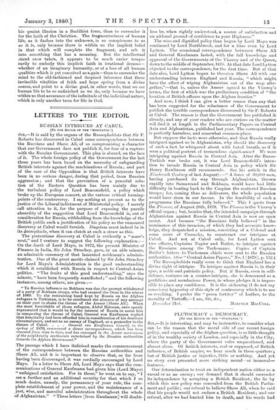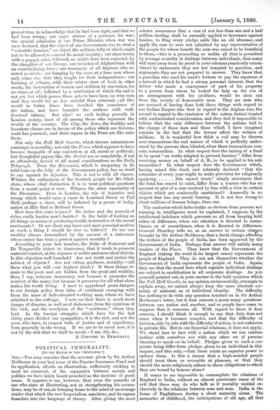PLUTOCRACY v. DEMOCRACY.
(TO THE EDITOR OF TILE " SPECTATOR."1
Sin,—It is interesting, and may be instructive, to consider what can be the reason that the moral side of our recent foreign policy, and especially of the Afghan question, is so little thought of in the wealthy society of London, and especially in the City, where the party of the Government rules unquestioned, and almost alone. Of British interests, real or supposed, of British influence, of British empire, we hear much in these quarters ; but of British justice or injustice, little or nothing. And yet no story ever presented more striking moral— or immoral— features.
Our determination to treat an independent nation either as a vassal or as an enemy ; our demand that it should surrender its independence by accepting a British Resident; the lie by which this new policy was concealed from the British Parlia- ment and public; our refusal to believe Shere Ali, when he said that his people would not endure a British Resident; and our refusal, after we had hunted him to death, and his words had
proved true, to acknowledge that he had been right, and that we had been wrong; our eager seizure of a pretence for war; the cynical admission of our Prime Minister, when war was once declared, that 'the object of our Government was to steal a "scientific frontier," an object the military folly of which ought not to be allowed to conceal its moral iniquity; our sham treaty with a puppet ruler, followed, as might have been expected, by the slaughter of our Envoy; our invasion of Afghanistan with an overwhelming force ; our treatment of all Afghans who re- sisted as rebels ; our hanging by the score at a time men whose only crime was that they fought for their independence; our burning of villages, with their winter store of food, in other words, the destruction of women and children by starvation, for no crime at all ; followed by a retribution of which the end is not yet, but which proves these acts to have been (as wise men said they would be) no less suicidal than criminal,—all this would in better times have revolted the conscience of the nation, and have branded the authors with well- deserved infamy. But alas ! no such feeling prevails in London society, least of all among those who represent the wealth of the country. The City, the Jews, the wealthy and luxurious classes are in favour of the policy which our Govern- ment has pursued; and their organs in the Press are like unto them.
Not only the Pall Mall Gazette, which throws ostentatious contempt on morality; not only the Times, which appears to have become incapable of any conviction at all, moral or political; but thoughtful papers like the Statist are as completely, if not as offensively, devoid of all moral considerations as the Daily Telegraph. Even the Economist, which is unsparing in its criticisms on the folly of the Government policy, has no word to say against its injustice. This is not so with all classes. Witness the enthusiasm of the Scottish people for Mr. Glad- stone, whose chief distinction it is to treat political questions from a moral point of view. Witness the stern unanimity of the Dissenters. Even in London, the tale of injustice and wrong which would raise a sneer in Lombard Street or Pall Mall, perhaps a cheer, will be followed by a groan of indig- nation at Mile End or Bethnal Green.
How does this come to pass ? Do riches and the pursuit of riches really harden men's hearts ? Is the habit of looking on all things as means of producing wealth destructive of the moral sentiments ? Or are there any baser and more personal motives at work, a thing I should be slow to believe? Or are our wealthy classes demoralised by the success of a statesman whose career has been a protest against morality ?
According to your last number, the Duke of Somerset and De Tocqueville object to democracy, that it tends to promote material comfort, at the expense of nobler and more ideal objects. Is this objection well founded? Are not truth and justice the noblest of objects ? Are not virtue, goodness, morality—call them what you will—our highest ideals ? If these things re- main to the poor, and are hidden from the great and wealthy, then, I say, welcome democracy, not because it promotes the comfort of the many, but because it preserves for all what alone makes life worth living. I used to apprehend great dangers to our foreign policy from tides of sentiment sweeping with them the mass of half-educated working men, whom we have admitted to the suffrage. I now see that there is much more danger of disaster, as well as of dishonour, from the cynicism of the rich, and the rowdyism of the "residuum," whom they lead. In the foreign struggles which have for the last thirty years divided our sympathies, it is the rich, and not the poor, who have, in respect both of justice and of expediency, been generally in the wrong. If we are to be saved now, it is not by the rich that we shall be saved.—I am, Sir, Sm.,
A CONVERT TO DEMOCRACY.











































 Previous page
Previous page